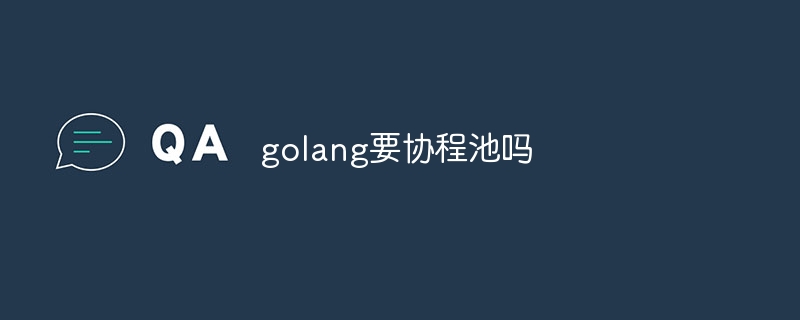
Golang does not require a coroutine pool. Specific reasons: 1. Golang's coroutine is very lightweight, and its creation and destruction costs are very low; 2. Golang's channel mechanism provides a safe and efficient task delivery method, which can limit the number of concurrent tasks, making it unnecessary An additional coroutine pool is needed to manage concurrency; 3. The Golang runtime includes an efficient coroutine scheduler, which can automatically schedule coroutines for execution in multiple threads; 4. Golang provides Goroutine leak detection tools, which are easy to manage The life cycle of the coroutine.

#The operating environment of this article: Windows 10 system, go1.20 version, dell g3 computer.
Golang is a programming language for developing high-performance concurrent applications. It has built-in lightweight goroutine and channel mechanisms, making concurrent programming simple and efficient. Coroutines are the basic building blocks of Golang's concurrency model, which allow multiple tasks to be executed simultaneously in a single thread without the need to explicitly create threads or perform lock operations.
The coroutine pool is a common concurrency mode used to limit the number of concurrent tasks to avoid the overhead caused by excessive creation and destruction of coroutines. It maintains a fixed-size coroutine collection, obtains coroutines from it to perform tasks when needed, and returns the coroutines to the pool for use by the next task when the task is completed. The purpose of the coroutine pool is to optimize the use of coroutines and avoid the performance overhead caused by frequent creation and destruction of coroutines.
However, in Golang, due to the characteristics of its coroutines and channels, the necessity of using the coroutine pool is not too high. The following are several reasons:
Lightweight coroutine: Golang's coroutine is very lightweight, and its creation and destruction costs are very low. This allows developers to easily execute a large number of tasks concurrently without paying too much attention to the creation and destruction costs of coroutines. High concurrency is easily achieved by using the natural scalability of coroutines.
Channel delivery task: Golang’s channel mechanism provides a safe and efficient way to deliver tasks. By passing tasks between coroutines, developers can better control the concurrency of tasks and limit the number of concurrent tasks, eliminating the need for additional coroutine pools to manage concurrency.
Coroutine scheduler: Golang’s runtime contains an efficient coroutine scheduler, which can automatically schedule coroutines for execution in multiple threads. This means that developers do not need to manually manage the allocation and execution of coroutines, but leave it to the scheduler.
Goroutine leak detection: Golang provides a Goroutine leak detection tool that can help developers detect whether there are unclosed coroutines to avoid wasting resources. This makes it easier for developers to manage the life cycle of coroutines without using a coroutine pool.
Although the coroutine pool is still useful in some specific scenarios, such as the need to limit the number of concurrent tasks, or the need to reuse long-running coroutines, in most cases In this case, using Golang's native coroutines and channel mechanisms is enough to meet the needs of concurrent programming. By using the native features provided by Golang, concurrent task processing can be implemented more simply and efficiently.
The above is the detailed content of Does golang need a coroutine pool?. For more information, please follow other related articles on the PHP Chinese website!
 How to define variables in golang
How to define variables in golang
 What are the data conversion methods in golang?
What are the data conversion methods in golang?
 What are the commonly used libraries in golang?
What are the commonly used libraries in golang?
 What is the difference between golang and python
What is the difference between golang and python
 How to install printer driver in linux
How to install printer driver in linux
 How to recover permanently deleted files on computer
How to recover permanently deleted files on computer
 minidump.dmp
minidump.dmp
 Can windows.old be deleted?
Can windows.old be deleted?